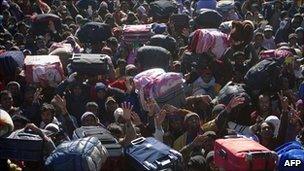Libya: UK and France to fly Egyptians from Tunisia
- Published

Egypt said it understood the anger of its nationals stranded at the border
Britain and France are sending several planes to help repatriate tens of thousands of Egyptians fleeing the violence in Libya.
The UN refugee agency UNHCR says "acres of people", many from Egypt, are now stranded in chaotic conditions at the Tunisian border.
Local resources are swamped and aid agencies have declared a humanitarian emergency.
Egypt said it was doing its best to repatriate its nationals.
France says it is also sending its second-largest warship, the helicopter carrier Mistral, to waters off Libya to help evacuate refugees.
Dire conditions
The Tunisian government says 80,000 people have entered the country in the past week to escape the fighting between supporters and opponents of Libya's ruler of four decades, Col Muammar Gaddafi.
Another 40,000 are still reported to be waiting on the Libyan side.
While most of the refugees are Egyptian, many are also from Vietnam, Bangladesh, countries in sub-Saharan Africa and elsewhere.
Watch: Aid agencies are warning of a humanitarian crisis
Most of them were migrant workers in Libya, who left their belongings behind when they fled to the nearest border and do not have the resources to arrange their own transport home.
The BBC's Jim Muir, at the Tunisian border, says people are living in dire conditions.
People are arriving at the crossing point exhausted, he says, and some are being crushed in the mass of people pressing to leave Libya.
World Food Program (WFP) spokeswoman Abeer Etefa said that most people had been travelling for three or four days.
"They are walking and have had nothing to eat for up to 48 hours," she told the Associated Press news agency.
The UN and the Tunisian authorities have established transit camps to shelter thousands of people but UNHCR spokesman Firas Kayal said the need far exceeded the supply.
"The situation is significantly increasing. The numbers keep flowing," he said, calling for a "massive international effort".
'Logistically delicate'
European Commission President Jose Manuel Barroso has described the situation as "a human tragedy" saying the world "must do more to help those who are in this terrible situation".
But Mr Barroso added that helping people leave was "logistically very delicate," as many do not have identification papers.
Britain has announced it is chartering commercial airliners to fly Egyptians home. Two flights left the UK for Tunisia on Wednesday and a third charter flight will leave Verona in Italy later.
"It is vital to do this; these people should not be kept in transit camps if it is possible to take them back home," Prime Minister David Cameron told Parliament.
The British planes will help evacuate up to 8,800 Egyptian migrants to Cairo, according to Associated Press news agency.
The French Foreign Ministry said it was sending planes and a ship to repatriate some 5,000 Egyptians over the next week.
The transitional government in Cairo has come under angry criticism from the refugees, who say it is not doing enough to help them get home.
Egyptian Foreign Ministry spokesman Hossam Zaki told the BBC their anger was understandable.
"I accept it. When you have been through hell and you make your way out to Tunisia, you want to find a plane, not a queue of 30,000 people," he said.
But he asked whether any country would be capable of moving so many people at such short notice.
Meanwhile, British charity Save the Children has warned that one million children are living in harm's way in western Libya, as forces loyal to Col Gaddafi fight for control of key towns and facilities.